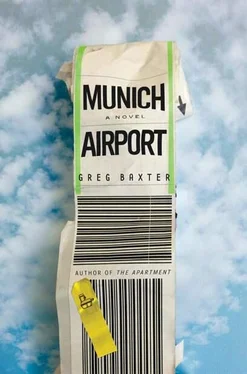We tried everything, I say, apart from admitting you to the hospital.
My father says, You know, I feel quite a bit better. I feel like I’ve slept. How long were you gone?
I say, It’s been about half an hour, at least.
Yes, he says, I must have slept, a good half hour has done the trick. But my back is killing me. Let’s go for a walk anyway. Did you get anything for a headache? Some ibuprofen, I say. I pop two tablets out of the foil and hand them to him. He swallows them without water. I take two myself. I hand two to Trish and she puts them in her bag — a small side pocket — for later. Trish looks at our trays of food despondently. They are untouched. Are you absolutely certain you won’t eat something else? she says. My father says, I can’t, sorry. Maybe later, I say. Trish softly shakes her head. My father stands. He is a bit wobbly. He has been sitting a long time and nearly has to sit again. I’ve had to help him stand or walk or sit a few times this trip, and it never gets less strange. The last time I saw him, six years ago, just a year after his retirement, he was fit, stable, and he still had enough strength to lift heavy things from his truck. But now, just six years later, he’s an old man. He’s frail. He can’t lift anything heavy. He gets tired easily. It’s perfectly normal for his age. What’s more surprising, perhaps, is how fit he was at the age of seventy. Here, I have walked him up hills. I have walked him down steps. I have helped him cross very busy roads. I have had him put his arms around my neck and lifted him out of a taxi. I tucked him into bed one night, because he’d become light-headed and a little breathless, but refused to go to the hospital. When I turned the light off, he said, Goodnight, son. I said, Goodnight, Dad. Now, as he wobbles, nearly falling back into his seat, I take his arm. Now I guide him from around the table. His balance returns — it comes slowly, arising in his eyes — and he seems steady, so he draws his arm away from mine. You okay? I ask. I’m okay, he says. Without fuss the four chairs around the table are taken by others.
When my father and I arrived at the airport this morning, we said good-bye to our driver, the Turkish man with the huge, furry-hooded jacket, and had a brief argument over whether or not to tip. We didn’t tip. We simply said thank you, and he told us to have a safe flight. It was still dark. But the bright white lamplight along the entrance to departures, in the fog, made the darkness glow. We watched the shuttle drive away. Part of me had wished to say to the driver, Listen, we’ve made a mistake, any chance we could go back to the hotel? Maybe they would be merciful and let us check back in to one of the rooms, just for two or three hours. If not, then at the very least we could find some couches in the lobby and close our eyes for a while. I really don’t know how I am still awake, and I don’t know how my father is still awake. I have slept four, maybe five hours in the last two days, and my father has probably slept less. We arrived in Munich yesterday, very early, off an overnight train, and we paid a visit to the undertaker to make sure Miriam’s body had arrived without any problems, and that all was set for the journey today. On the train we had a compartment to ourselves. When we realized that we were on our own, and we closed the door for the night, we figured we would sleep for sure. We stretched the seats out into beds across the whole cabin. The beds were wide. Though the seats we’d reserved were beside each other, because we had the whole compartment we chose to leave the space of one bed between us. We lay down, propped up on some pillows, but fixed cushions that ran vertically between the seats meant we couldn’t see each other, only our bodies and legs and feet. We pulled white bedsheets over ourselves. They were coarse and smelled like soap. My father had no book with him, so I gave him a music magazine I’d brought with me. My father gave the magazine a perfunctory flip-through and sighed and asked if he could switch off the light. Of course, I said, and I turned on a little penlight that arched down from the console behind my bed. I had a book about Europe during the Thirty Years War — more than any other type of book, I read history books, and I had picked it up at an English-language bookstore not far from Miriam’s apartment in Berlin. I read and took notes for an hour before finally turning off my light and closing my eyes. My father said, I can’t sleep, it’s no good, you can turn your light back on if you like. I said, This is a fascinating book. He said, You’ve always taken notes, but what for? I haven’t always taken notes, I said.
You sure have, obviously before you can remember, you were taking notes.
Was I?
You were taking notes since your mother was pregnant with Miriam. She was monitoring her progress — because she’d had the problematic pregnancy with you — and you monitored her progress with her. Then you didn’t stop. When Miriam was four or five, you taught her to take notes.
Otherwise I can’t focus, that’s why I take them, I said.
I’m the same, or at least I was, he said. But where do they go, once you’ve got them down?
I thought for a bit. I said, Nowhere, my memory, I suspect.
We spoke for a while longer, and when it was obvious that we weren’t going to fall asleep soon, I drew the curtains wide so we could watch outside. We propped ourselves up on the pillows again and watched the dark countryside go by. The train was smooth, but we were really flying. We shot through isolated clouds of fog. We saw some snow. Mostly it was sleeting. Every once in a while, something bright went by — a bridge, a fortress in the distance. From time to time the train slowed down at a fogged-over station, or in fogged-over towns. Sometimes it stopped, and the hydraulics whined and exhaled. My father tried to convince me that once we got to the States, I ought to stay for a while. It was obvious, to him, that I needed to get out of London, even if it wasn’t obvious to me, even if it hadn’t occurred to me. I told him I was doing fine, and anyway it wasn’t possible. I needed to get back to work. After that, we started to doze off, but by then there wasn’t a whole lot of night left. When we got to Munich and met the undertaker, he asked if we’d like to see the coffin, which was closed, and my father, surprisingly, said it wasn’t necessary, that we’d wait until we arrived in the States.
When the hotel shuttle was out of sight, I said, I could use a coffee. I could use some coffee myself, said my father, what time is it? It’s six, I said. When are we meeting Trish again? he asked. Ten-ish, I said. My father said, Oh. But he knew what time it was, and he knew we had to wait until ten to meet Trish. I was worried he was going to start complaining that I should not have let him leave the hotel, I should have forced him to try and sleep, but he just yawned. He looked behind him, through the entrance, and up — the structure on that side, the check-in side, is a great glass box, and there are four levels in it, arranged like steps — wondering if he would finally run out of space to outpace his worry and his sorrow. Yesterday, when we arrived in Munich, we left our bags at the train station because check-in at the hotel wasn’t until the afternoon. The visit to the undertaker’s upset him, and it really hadn’t been necessary, everything could have been confirmed with a phone call. He asked if the coffin would be loaded discreetly and humanely into the airplane. The undertaker assured us that it would be, and moreover, it would be situated separately from ordinary luggage. The coffin would rest in a dedicated section of the cargo hold, and be placed there in a dignified manner by the undertakers, working with the baggage handlers. The undertakers themselves would ensure that the coffin was safely in place and secure. But what about our connection in Atlanta? he asked. The undertaker, who was of medium height, bald, with a thick mustache, and who wore the customary black suit with a white shirt and black tie, said that the American undertaker, who would receive the body under the terms of agreement, would make sure everything was handled appropriately in Atlanta. When we were finished, we still had a couple of hours before check-in at the airport hotel. Before we left Berlin, Trish had offered to come meet us while we were in Munich, treat us to a coffee or a drink, but my father told her it wasn’t right or necessary, that her coming to the airport on Sunday was enough. But as soon as we left the undertaker’s, I could see he regretted her absence. He wished to see her. His nerves were destroyed, and he was pale, and his eyes were red and melancholic, and I figured it was because he’d run out of things that had to be done before our departure. I said I was going to the museum where they had some Klimt paintings. A painting I had loved all my adult life was here — though I had only seen it in books and on computer screens— Music I . My father was disappointed in me. I told him to go for a walk and meet me later.
Читать дальше











